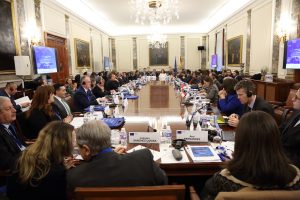
23/01/2018
Under the impetus of a programme financed by the European Commission, EuroMed Justice, is signed an agreement aimed at improving their international judicial cooperation
Prosecutors General from Europe and Mediterranean countries (Algeria, Egypt, Israel, Jordan, Lebanon, Morocco, the Palestinian Authority, and Tunisia) signed an agreement aimed at improving their international judicial cooperation. The signing of the first Declaration of collaboration in the two regions took place under the impetus of a programme financed by the European Commission for cooperation between the countries of Europe and the Mediterranean, EuroMed Justice. A partner of EuroMed since the very beginning, the United Nations Security Council Counter-Terrorism Committee Executive Directorate (CTED) assisted in the drafting of the declaration as part of its efforts to actively promote cross-regional cooperation.
Managed by the International and Ibero-American Foundation for Administration and Public Policies (FIIAPP), the project brought together in Madrid the Prosecutors General of the countries participating in the First EuroMediterranean Forum of Prosecutors General. Promoted by the Spanish Prosecutor General’s Office, the forum was well received and welcomed by the Prosecutors General from the participating countries. The forum allowed the Prosecutors General to share experiences and best practices on issues related to the fight against terrorism and organised crime, including human and drug trafficking, and cybercrime. The forum also approved the Roadmap for the consolidation of a EuroMediterranean Prosecutors General Network.
“The creation of the EuroMed Forum of Prosecutors General is an excellent cross-regional platform to build trust, confidence, and mutual understanding at the highest levels. These are all crucial components of effective judicial cooperation in counter-terrorism,” said Anton du Plessis, Senior Legal Officer and Legal and Criminal Justice Coordinator with UN CTED.

“As Prosecutors General of our States and as defenders of the rights of citizens, we are obliged to improve our cooperation to better respond to transnational crimes,” said the State Prosecutor General of Spain.
The Director of the FIIAPP, Pedro Flores, emphasized that “EuroMed Justice is an excellent example of the relevance of this type of programmes in the field of European cooperation, of the commitment to horizontal relationships between peers, and of how we can jointly face our shared challenges.
In his speech, the Prosecutor General declared the EuroMed Prosecutors General Forum to be a platform for dialogue, coordination, and consultation to increase mutual trust between the countries, and for promoting the participation of the Mediterranean countries in cross-border and regional judicial cooperation.
This project will promote the sharing of good practices between European partners. These will include the practices of European judicial networks for the exchange of information or the application of new collaboration techniques such as so-called joint investigation teams, which are coordinated from Eurojust in order to combat the most complex crimes in an effective way.
Project Director Victoria Palau, explains: “Judicial cooperation is essential because of problems such as terrorism, cybercrime, or human trafficking that, if not resolved at a regional level, are impossible to combat.”
The project will last three years and is the continuation of work that has been undertaken since 2004 under the EuroMed Justice programme. Its objective is to achieve efficient, effective, and democratic judicial systems.
The project has three key focal points in promoting criminal and civil judicial cooperation, namely matters relating to families, improving access to justice, and judicial independence. These issues directly affect the lives of European citizens and the Mediterranean countries.
The project will last three years and have European funding to the tune of 4.2 million euros. It is the fourth phase of the EuroMed programme, which has continuously counted on the support of the State Prosecutor General, the Ministry of Justice, and the General Council of the Judiciary.